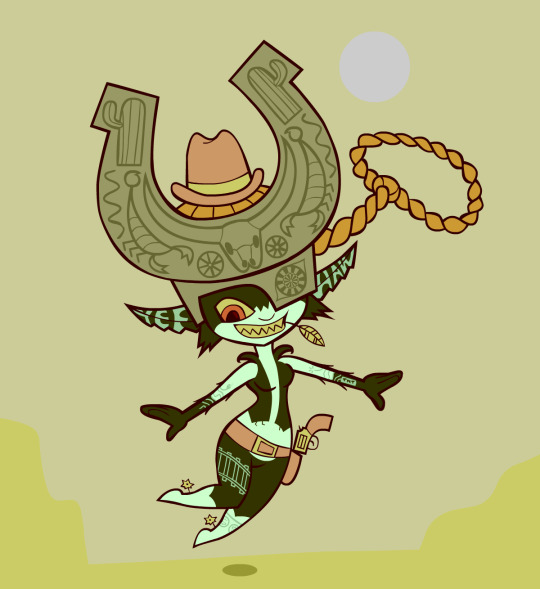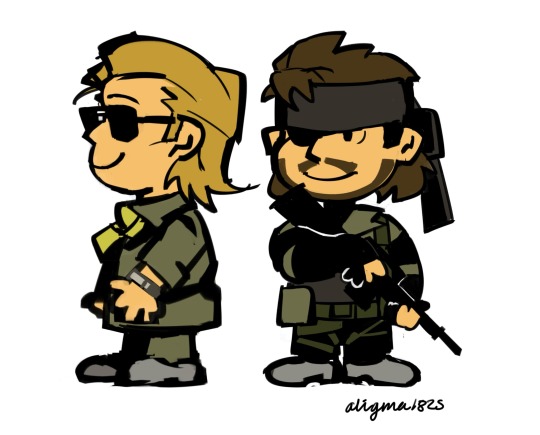Text
Eureka is the only ttrpg made specifically to allow Columbo and Jacket to team up with a vampire to do an escape room.
@abstractlime
288 notes
·
View notes
Text


KICKSTARTER'S ON BABY
GO SUPPORT MY FRIEND'S PROJECT
58 notes
·
View notes
Text
Why I Dislike PbtA Games, and How Eureka: Investigative Urban Fantasy is Their Opposite

@tender-curiosities

It is no secret that I hate PbtA games.
Though due to a recent misunderstanding regarding another post, I’m going to preface this post by saying that this is going to be a very opinionated post and
I do not seriously think that PbtA games are inherently bad, though I may sometimes joke about this.
While I do often question the taste of people who make and play PbtA hacks, I do not think poorly of their moral character.
While I am going to call for PbtA to be used less as a base for games in the future, I’m not saying that the whole system and all games based on it should be destructified. It’s good for what it’s good for, but unless you’re doing that, I really think you should use something else.
Now that that is out of the way, here’s what I have to say about it.
My first experiences with PbtA games were pretty rough. Monster of the Week was not the first, but it was one of the first ‘indie’ TTRPGs I played after having previously played mostly only D&D3.5e and 5e. I really appreciated that the use of 2D6 over a D20 meant that the dice results would be more predictable, and I really liked the various “classes” I was seeing. (At this time, I didn’t really understand that they weren’t really “classes” at all, though I think I can be forgiven for this because many people, even people who like PbtA games, still talk like “classes” and “playbooks” are interchangeable.)
I was very enthusiastic to play, until it came time to start actually “making” a character, and found that I couldn’t “make” a character. I wanted to make a nuanced, three-dimensional PC who was simultaneously stereotype-affirming and stereotype-defying, with a unique backstory and dynamic with the other characters—but when I went to actually fill out the character sheet for basically any “class”, I found that most of the backstory and most of the personality for my character was being set for me by the playbook. It felt like the only thing about the character I really had a say in was their name, and that two PCs of the same playbook would actually turn out to be almost identical characters. At the time, I thought this was very restrictive and very bad design.
Later, now that I understand the design intent behind it, I still think of it as very restrictive, but I think of it as very bad design for me, not inherently bad.
When I play a TTRPG, I want more freedom in who my PC is. That doesn’t mean I want less rules, in fact having more rules can often increase freedom, but that’s a different post. I want to create original, unique characters, that I won’t see anywhere else. If it’s a class-based system, I want that class to barely touch the details of my character’s backstory or personality, so that I can come up with something original and engaging for why and how this “Fighter” fights. This means that two level-1 Fighters, despite having almost the same mechanical abilities, will potentially be very different people.
PbtA games don’t let you do that. In a lot of PbtA games, you’re not playing your own original character, you’re playing someone else’s character, that every other player that has picked up the same playbook before you has played. It’s more like “character select” than “character creation.” I think I could liken it to playing Mass Effect or The Witcher. Every player may pick a few different dialogue choices in those games that change the story, but we’re still all playing Shepherd or Geralt. No one is going to experience a new never-before-seen story in Mass Effect or The Witcher, which is very much a factor of them being video games and not TTRPGs, and therefore limited to the amount of code, writing, and voice-acting that can go into them.
This anonymous asker who sent a message to @thydungeongal seems to feel pretty similarly to me about PbtA games, and @thydungeongal's response is a very good response about how people find this appealing.
I have more respect for PbtA now than I did, but I still don't like it because to me it seems to play so much against what I consider to be the strengths of TTRPGs as a medium, much like how video games like The Last of Us and David Cage games play against the strengths of the medium of video games, and I will never like it. But other people clearly do, so to each their own.
Then another reason I don’t like it is because I think it’s oversaturating the TTRPG space. I’ve referred to PbtA before as “indie D&D5e”, and i do think that’s a reasonable comparison, because in much the same way that you always hear “D&D5e is a system that can do everything”, I think a lot of people seem to be under the impression that the PbtA system is a system that can do anything. It’s kinda the système du jour for indie TTRPGs right now, and many iterations of it make it clear that many designers do not consider how PbtA differs from more traditional TTRPGs, and how it is specialized for different types of TTRPG gameplay. Just like how I feel PbtA isn’t playing to certain important strengths of TTRPGs, I think that many—maybe even most—PbtA hacks don’t play to the strengths of PbtA. But this isn’t really PbtA’s fault, that comes down to any individual indie TTRPG developer on a case-by-case basis. And the cure for that is something I’m always saying: If you are going to be a writer, you have got to read lots of books. If you are going to be a director, you have got to watch lots of movies. If you are going to be a video game developer, you have got to play lots of video games. And if you are going to be a TTRPG designer, you have got to read and play lots of TTRPGs. That and you have to understand that TTRPGs are specialized. Even "agnostic" systems like PbtA are somewhat specialized, and therefore might really not be a great fit for the game you’re trying to make.
That and, to get more subjective again, there’s like an ocean of them, and I don’t even like the ones that are actually good.
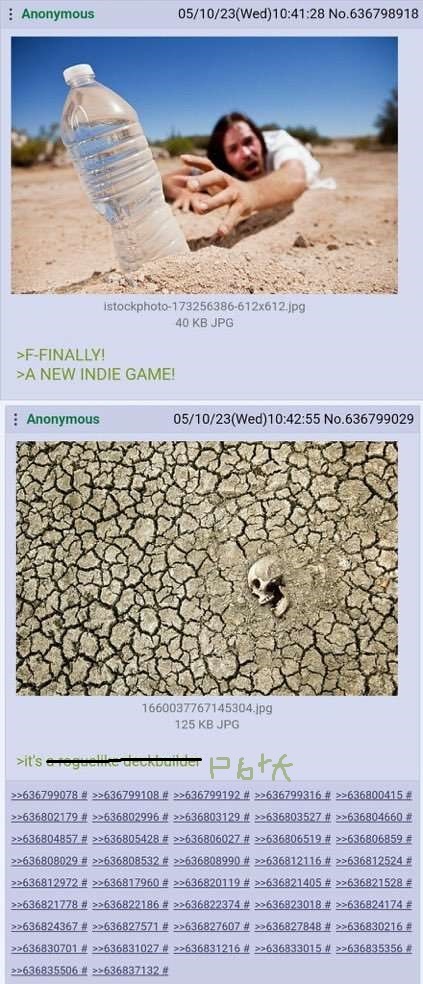
Now that I’ve talked about how I don’t like PbtA games, I’m gonna talk about a game I do like: Eureka: Investigative Urban Fantasy. Obviously, I like it because I’m the lead writer for it, but I would also like it even if I wasn’t the lead writer for it, because it’s just my kinda game. Eureka is the opposite of a PbtA game. I wrote it to play to what I feel are the strengths of the TTRPG medium.
Eureka’s character creation uses personality traits as a mechanical element of the character, but it does so in a deliberately freeform way. You build your character’s personality out of a list of traits, so who your character is is very much linked to what your character can do, but we aren’t just handing you a pre-made character.
Eureka is designed to incentivize organic decision-making by the PCs, most often by the mechanics of the game mirroring the world they live in. Every mechanic aims to create situations wherein “what will the PC do next?” is a question whose answer can be predicted - it doesn’t need to be ordained by a playbook.
One of my favorite examples of this is, rather than a “Fear Check” forcing the PC to run away if they fail, or “Run Away from Danger” being a “Move” on their character sheet, Eureka opts for the Composure mechanic. The really short version is that one of the main things that lowers a PC’s Composure is encountering scary stuff, and the lower a PC’s Composure, the more likely they are to fail skill checks, and the more likely they are to fail skill checks, well, the less brave they and their player probably feel about them standing up to this scary monster. So if the PC has low Composure, they are more likely to choose to run away. The lower their Composure, the better idea that will seem.
This system really really shines when it comes to monster PCs in Eureka. Most monsters benefit a lot more from having high Composure, but have fewer ways to restore Composure than mundane PCs. Their main way to restore their Composure is by eating people. The rulebook never says “your monster PC has to eat people”, but more likely than not, they’re going to be organically steered towards that by the game and world itself. Sure, they could decide to be “one of the good ones”, and just never eat people, just like you reading this could decide to stop eating food. You technically could, but when your body starts to fail, how long would you? (This is a big part of the themes of Eureka and what it has to say about crime, disability, mental illness, and evil. People don’t just arbitrarily do bad things, it is often their circumstances that leads them down that path until they see little choice for themselves in that matter, and “harmful” people are still just as deserving of life as people who “aren’t harmful”, but that really deserves its own post.)
It has been said that Eureka: Investigative Urban Fantasy actually arrives at much the same end as the PbtA game Monsterhearts, and I actually don’t disagree, but it gets there from an entirely different starting point and direction. The monster PCs in Eureka are very likely to eat people and cause drama, but it won’t be because they have “Eat People and Cause Drama” as a “Move” on their character sheet.
Monsters in Eureka have a lot of abilities, which they can use to solve (and create) problems as the emergent story emerges organically.
(Oh and Eureka is about adult investigators investigating mysteries, and sometimes those investigators are monsters, not about monster kids in high school, to be clear. The same “end” that Eureka and Monsterhearts reach is that of the monsters being prone to cause problems and drama due to the fact that they are monsters, though this isn’t the sole point of Eureka, just one element of it.)
You can pick up the free shareware version of this game from the download link on our website, or the full version for $5 from our Patreon.
And don’t forget, Eureka is fundraising on Kickstarter starting on April 10th, 2024! We need your support there most of all, to make sure we hit our goals and can afford to make the best version of Eureka we can make!
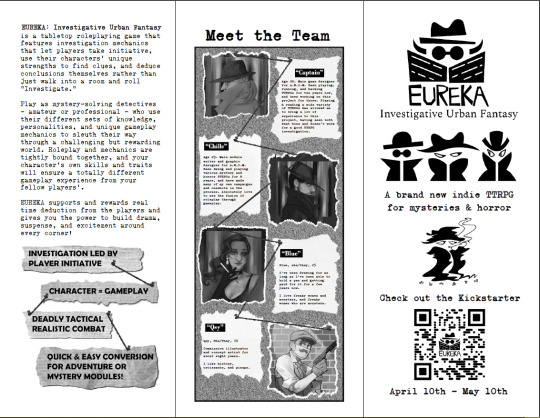
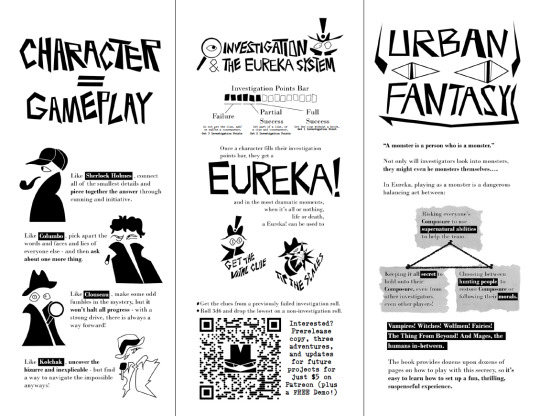
Interested in branching out but can’t get your group to play anything but D&D5e? Join us at the A.N.I.M. TTRPG Book Club, where we nominate, vote on, and play indie TTRPGs, all organized by our team with no strict schedule requirement! Here's the invite link! See you there!
We also have merchandise.

218 notes
·
View notes
Text
Why I Dislike PbtA Games, and How Eureka: Investigative Urban Fantasy is Their Opposite

@tender-curiosities

It is no secret that I hate PbtA games.
Though due to a recent misunderstanding regarding another post, I’m going to preface this post by saying that this is going to be a very opinionated post and
I do not seriously think that PbtA games are inherently bad, though I may sometimes joke about this.
While I do often question the taste of people who make and play PbtA hacks, I do not think poorly of their moral character.
While I am going to call for PbtA to be used less as a base for games in the future, I’m not saying that the whole system and all games based on it should be destructified. It’s good for what it’s good for, but unless you’re doing that, I really think you should use something else.
Now that that is out of the way, here’s what I have to say about it.
My first experiences with PbtA games were pretty rough. Monster of the Week was not the first, but it was one of the first ‘indie’ TTRPGs I played after having previously played mostly only D&D3.5e and 5e. I really appreciated that the use of 2D6 over a D20 meant that the dice results would be more predictable, and I really liked the various “classes” I was seeing. (At this time, I didn’t really understand that they weren’t really “classes” at all, though I think I can be forgiven for this because many people, even people who like PbtA games, still talk like “classes” and “playbooks” are interchangeable.)
I was very enthusiastic to play, until it came time to start actually “making” a character, and found that I couldn’t “make” a character. I wanted to make a nuanced, three-dimensional PC who was simultaneously stereotype-affirming and stereotype-defying, with a unique backstory and dynamic with the other characters—but when I went to actually fill out the character sheet for basically any “class”, I found that most of the backstory and most of the personality for my character was being set for me by the playbook. It felt like the only thing about the character I really had a say in was their name, and that two PCs of the same playbook would actually turn out to be almost identical characters. At the time, I thought this was very restrictive and very bad design.
Later, now that I understand the design intent behind it, I still think of it as very restrictive, but I think of it as very bad design for me, not inherently bad.
When I play a TTRPG, I want more freedom in who my PC is. That doesn’t mean I want less rules, in fact having more rules can often increase freedom, but that’s a different post. I want to create original, unique characters, that I won’t see anywhere else. If it’s a class-based system, I want that class to barely touch the details of my character’s backstory or personality, so that I can come up with something original and engaging for why and how this “Fighter” fights. This means that two level-1 Fighters, despite having almost the same mechanical abilities, will potentially be very different people.
PbtA games don’t let you do that. In a lot of PbtA games, you’re not playing your own original character, you’re playing someone else’s character, that every other player that has picked up the same playbook before you has played. It’s more like “character select” than “character creation.” I think I could liken it to playing Mass Effect or The Witcher. Every player may pick a few different dialogue choices in those games that change the story, but we’re still all playing Shepherd or Geralt. No one is going to experience a new never-before-seen story in Mass Effect or The Witcher, which is very much a factor of them being video games and not TTRPGs, and therefore limited to the amount of code, writing, and voice-acting that can go into them.
This anonymous asker who sent a message to @thydungeongal seems to feel pretty similarly to me about PbtA games, and @thydungeongal's response is a very good response about how people find this appealing.
I have more respect for PbtA now than I did, but I still don't like it because to me it seems to play so much against what I consider to be the strengths of TTRPGs as a medium, much like how video games like The Last of Us and David Cage games play against the strengths of the medium of video games, and I will never like it. But other people clearly do, so to each their own.
Then another reason I don’t like it is because I think it’s oversaturating the TTRPG space. I’ve referred to PbtA before as “indie D&D5e”, and i do think that’s a reasonable comparison, because in much the same way that you always hear “D&D5e is a system that can do everything”, I think a lot of people seem to be under the impression that the PbtA system is a system that can do anything. It’s kinda the système du jour for indie TTRPGs right now, and many iterations of it make it clear that many designers do not consider how PbtA differs from more traditional TTRPGs, and how it is specialized for different types of TTRPG gameplay. Just like how I feel PbtA isn’t playing to certain important strengths of TTRPGs, I think that many—maybe even most—PbtA hacks don’t play to the strengths of PbtA. But this isn’t really PbtA’s fault, that comes down to any individual indie TTRPG developer on a case-by-case basis. And the cure for that is something I’m always saying: If you are going to be a writer, you have got to read lots of books. If you are going to be a director, you have got to watch lots of movies. If you are going to be a video game developer, you have got to play lots of video games. And if you are going to be a TTRPG designer, you have got to read and play lots of TTRPGs. That and you have to understand that TTRPGs are specialized. Even "agnostic" systems like PbtA are somewhat specialized, and therefore might really not be a great fit for the game you’re trying to make.
That and, to get more subjective again, there’s like an ocean of them, and I don’t even like the ones that are actually good.

Now that I’ve talked about how I don’t like PbtA games, I’m gonna talk about a game I do like: Eureka: Investigative Urban Fantasy. Obviously, I like it because I’m the lead writer for it, but I would also like it even if I wasn’t the lead writer for it, because it’s just my kinda game. Eureka is the opposite of a PbtA game. I wrote it to play to what I feel are the strengths of the TTRPG medium.
Eureka’s character creation uses personality traits as a mechanical element of the character, but it does so in a deliberately freeform way. You build your character’s personality out of a list of traits, so who your character is is very much linked to what your character can do, but we aren’t just handing you a pre-made character.
Eureka is designed to incentivize organic decision-making by the PCs, most often by the mechanics of the game mirroring the world they live in. Every mechanic aims to create situations wherein “what will the PC do next?” is a question whose answer can be predicted - it doesn’t need to be ordained by a playbook.
One of my favorite examples of this is, rather than a “Fear Check” forcing the PC to run away if they fail, or “Run Away from Danger” being a “Move” on their character sheet, Eureka opts for the Composure mechanic. The really short version is that one of the main things that lowers a PC’s Composure is encountering scary stuff, and the lower a PC’s Composure, the more likely they are to fail skill checks, and the more likely they are to fail skill checks, well, the less brave they and their player probably feel about them standing up to this scary monster. So if the PC has low Composure, they are more likely to choose to run away. The lower their Composure, the better idea that will seem.
This system really really shines when it comes to monster PCs in Eureka. Most monsters benefit a lot more from having high Composure, but have fewer ways to restore Composure than mundane PCs. Their main way to restore their Composure is by eating people. The rulebook never says “your monster PC has to eat people”, but more likely than not, they’re going to be organically steered towards that by the game and world itself. Sure, they could decide to be “one of the good ones”, and just never eat people, just like you reading this could decide to stop eating food. You technically could, but when your body starts to fail, how long would you? (This is a big part of the themes of Eureka and what it has to say about crime, disability, mental illness, and evil. People don’t just arbitrarily do bad things, it is often their circumstances that leads them down that path until they see little choice for themselves in that matter, and “harmful” people are still just as deserving of life as people who “aren’t harmful”, but that really deserves its own post.)
It has been said that Eureka: Investigative Urban Fantasy actually arrives at much the same end as the PbtA game Monsterhearts, and I actually don’t disagree, but it gets there from an entirely different starting point and direction. The monster PCs in Eureka are very likely to eat people and cause drama, but it won’t be because they have “Eat People and Cause Drama” as a “Move” on their character sheet.
Monsters in Eureka have a lot of abilities, which they can use to solve (and create) problems as the emergent story emerges organically.
(Oh and Eureka is about adult investigators investigating mysteries, and sometimes those investigators are monsters, not about monster kids in high school, to be clear. The same “end” that Eureka and Monsterhearts reach is that of the monsters being prone to cause problems and drama due to the fact that they are monsters, though this isn’t the sole point of Eureka, just one element of it.)
You can pick up the free shareware version of this game from the download link on our website, or the full version for $5 from our Patreon.
And don’t forget, Eureka is fundraising on Kickstarter starting on April 10th, 2024! We need your support there most of all, to make sure we hit our goals and can afford to make the best version of Eureka we can make!


Interested in branching out but can’t get your group to play anything but D&D5e? Join us at the A.N.I.M. TTRPG Book Club, where we nominate, vote on, and play indie TTRPGs, all organized by our team with no strict schedule requirement! Here's the invite link! See you there!
We also have merchandise.

218 notes
·
View notes
Text
hey has tumblr.com as in like the actual website itself been running like dogshit lately. load times have been atrocious. stuff just isn't working. etc.
2K notes
·
View notes
Text
I love that a lot of fans have taken to calling the thing from beyond “the blanket”
23 notes
·
View notes
Note
Do you have any games that involve urban fantasy with less focus on fighting than something like Dresden or Shadowrun?
THEME: Urban Fantasy (Minimal Fighting)
Hello there! What I’ve got here is quite a mix, I wasn’t sure how much violence you wanted (or didn’t want) so I have a little bit of romance, a little bit of nostalgia, and a little bit of horror!


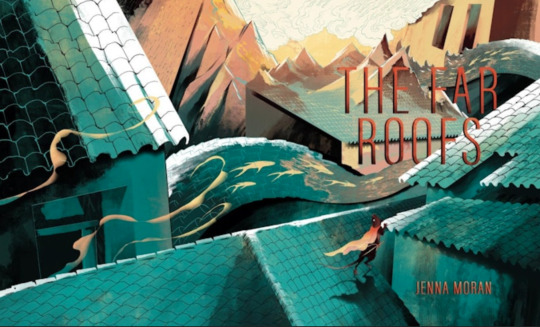

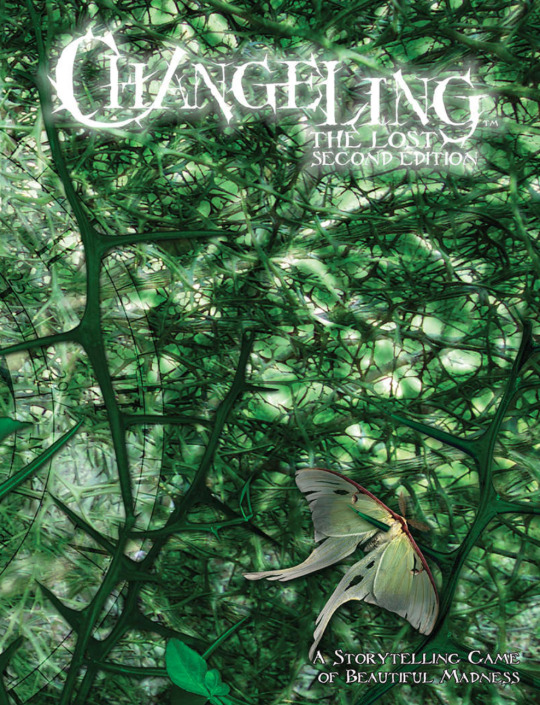

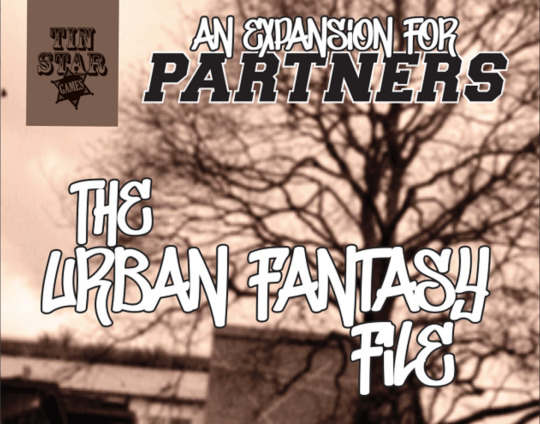

City of Mist, by Son of Oak Games.
City of Mist is a role-playing game of film-noir investigation and super-powered action. It is set in a modern metropolis rife with crime, conspiracies, and mysteries. The protagonists are Rifts, ordinary people who became the living embodiment of a legend, their Mythos. While your Rifts may seek to strike a balance between the mysterious nature of their Mythos and their mortal aspirations, the powers within them always threaten to tear their lives apart. They have unwittingly become a part of a secret world of clashing stories, and soon other legends will come looking for them with demands.
City of Mist is a combination of PbtA and FATE, giving your characters descriptive tags to use for both their benefit and their detriment as they go about solving mysteries in a supernaturally-saturated city. The primary theme of the game is mystery, and thus more than anything your characters will be primed for investigation. That’s not to say that there isn’t violence - but violence and fighting can be de-emphasized if the group is more interested in the mystery side of things.
Character Creation involves a combination of mundane and supernatural themes, as your character is endeavouring to strike a balance with the parts of themselves that they recognize (student, parent, office worker, ex-partner) and the parts of themselves that are hard to understand (mythical beast, deity, folktale, urban legend). What’s important to define is your daily routine, your personality, and what kind of supernatural powers you have.
This game isn’t explicitly anti-violent, but it absolutely provides you with ways to solve problems that aren’t violent, so I think City of Mist is worth checking out.
Scary Monsters & Nice Sprites, by Pammu.
Scary Monsters and Nice Sprites is a narrative RPG about spending your night in one of the only clubs in your city that’s safe for creatures of the night like yourself. All you want to do is have some fun just like the humans do. Play a supernatural creature of choice, put some sick EDM on the speakers and get your game on!
This game works best for an even number of players, up to 6, and is GM-less. It combines urban monsters with flirting, dark clubs and hookups. Each of your characters will look for a partner by doing things that will appeal to the other players. If they like what you do, they’ll reward you with tokens, which you can spend to improve the atmosphere of the club. Fill another player’s intimacy meter, you’ve won them over, and the two of you decide how the night ends for both of your characters.
If you want a game about flirting and the magic of a nightclub, this is your game.
The Far Roofs, by Jenna Katerin Moran.
The Far Roofs is an original role playing system and bundled campaign using pens or pencils, paper, six-sided dice, ten-sided dice, playing cards, and a bag of letter tiles. It’s complete in one volume: with this one book and the equipment above, you’ll have everything you need to play.
As the story progresses, your characters will gain access to over 150 unique, narrative-focused powers developed and refined over the course of a decade for the Chuubo’s Marvelous Wish-Granting Engine RPG before being simplified and adapted for use herein.
The Far Roofs is still being Kickstarted, but Moran’s work on Chuubo’s Wish-Granting Engine produced a game that emphasizes wonder and emotional experience. The Far Roofs looks to deliver along the same lines, and the examples of play point towards investigation, social interaction, and magic powers. Jenna Moran is also known for her unique and evocative storytelling in her work, so I think it’s definitely worth checking out.
Lighthearted, by Kurt & Kate Potts.
Welcome to the magical 80s dream world of Lighthearted. You are a Prep, Jock, Geek, Rebel, or Outcast, like those kids in The Breakfast Club, except you are just about to start magic community college. Through play, we’ll explore how you grow out of your high school cliques all while dealing with magical mishaps, college parties, vampires, and worse—finals!
Lighthearted is a complete tabletop roleplaying game that uses the language of film and television to reimagine the coming of age stories popular in 80s teen movies like Weird Science and Sixteen Candles, but with a modern fantasy spin. It’s set in an alternate 1980s with fantasy elements weaved into the most outlandish bits of 80’s pop culture. There are fantasy religions mixed in with mall culture, dark magic cold wars, and magical glamours instead of plastic surgery.
This is a game of magic and coming-of-age, as you play first-year students at a magical community college. You’re off to the big city, and the big world - will you survive your first college party? Your first vampire?
The whole game feels like the neon lights of a vibrant night-life combined with the nostalgia of an 80’s film. Your magic is attached to how you feel, so as your emotions change, so will your effectiveness at certain actions. If you want a game that’s as light as its name, and you are seeking out rosy-tinted nostalgia, this might be your game.
Changeling: the Lost, by Onyx Path.
Once upon a time, they took you from your home. They promised you a place at their side, and meaning in your life, and they surrounded you with beautiful things. But the beautiful things were oh so sharp, and they laughed when you bled.
Day by day, they changed you. But day by day, your will grew stronger. On the last day, you smashed your way through the beautiful things and ran, not noticing as you bled or feeling as you cried.
You fought with courage and cleverness and took yourself home. Now the beauty and the horror are yours, to have and to hold and to live.
Welcome to once upon right fucking now.
So I’m familiar only with the 1st edition of Changeling, but as far as I understand, the setting and core premise of the game is the same in the 2nd edition. Changeling: the Lost is a game of fairy trauma. Your characters are survivors of a fae horrorscape, a place both wondrous and terrifying all at once. This game is solidly in the horror genre, but it contains within it a taste of the magical, and it’s also the reason I got into roleplaying in the first place.
As in many Chronicles of Darkness games, fighting is an option in here, but it’s not a wise option. Getting into fights pulls at your characters’ ability to understand the difference between our world and the world of Fae, it’s very easy to sustain supernatural damage that is hard to heal, and, well, sometimes it’s hard to tell who your real enemies are in the first place.
I’d say that Changeling is more of a political game than anything else. Your characters will have to dance through the highly literal wording of faerie pledges, and untangle difficult relationships between Courts that are both safe havens and potential beds of sedition. This is a violent game, but much of the violence possible in Changeling isn’t physical - it’s emotional.
This Night On The Rooftops, by C.M. Ruebsaat.
This is a game about gazing out over the smokestacks after dark, with the wind in your hair and a friend at your side and a thousand lights of progress on the streets below.
This Night on the Rooftops is a collaborative storytelling game for 2-5 players about friendship, growing up, and revolution. You will play members of a gang of children in The City, a fantastic world of industry and dying magic, where witches labour alongside factory-workers to make ends meet.
This game looks slightly less modern, but it takes the fantasy aspect of witchcraft and places it inside an industrial city. The game uses a modified version of the No Dice No Masters rule set, which is excellent for stories that have an ebb and flow to them, managed through the use of token expenditure. This game is also GM-less, giving everyone at the table the same amount of control over what happens next.
Since the characters are a gang of teenage witches looking to make ends meet, this game doesn’t strike me as one that prioritizes fighting or violence. The city looks big enough to grind up the characters if they’re not careful, so they’ll likely have to find solutions to problems that don’t get them (or their dependants) in trouble. If the game is like other No Dice No Masters games that I’m familiar with, the group will also have a big say over which elements of the city are the most intriguing to them.
Partners: The Urban Fantasy File, by Tin Star Games.
Some murders are just elf defence…
Vampires are real, magic is real, elves are real - and murder is still very very real. This expansion takes you and your Partner down the moonlit streets of urban fantasy, where the dead sometimes get back up again but crime is still a mystery needing two heads to solve.
The base game for this, Partners, is a two-player mystery-solving game about a pair of detectives, a straight-shooter and a wildcard. You’ll need the base rules to play, but this supplement brings in dead elves, suspicious vampires, and other common characters in any urban fantasy genre. It can work as a one-shot, or as a series of episodes. If you want a game that’s primarily about solving a mystery more than anything else, this is is for you.
Solacebound, by Sascha Moore.
Young monsters played at the boundary between the worlds. They slipped and stranded in a human city. Isolated and unwelcome, they search for each others help and a way back.
Solacebound is a GM-less Game for 3-5 people to play over a few hours. Search a sprawling, oppressive city for your friends, find out who is willing to give you a roof, bash back against authorities, cook together and console each other. Will you find a way back home before all passages close?
You are teenage monsters trying to find their way through an urban environment, in a place that is hostile to them. You survive by hiding out, finding each-other, and do things together to make sure you keep each-other healthy. Cards from a deck act as resources, but also as an oracle to help you describe the fallout of any given action, and the emotions that are attached to it. This is a game about metaphors, about what it is like to live in a place that fears you, so I definitely recommend making sure the entire table knows what this is about before starting a game.
You Might Also Want to Check Out
Subway Runners, by Gem Room Games.
51 notes
·
View notes
Text
Finding something cool and thematically rich and wanting to see what other people think abt it and all I find is shipping

32K notes
·
View notes
Text
Eureka: Investigative Urban Fantasy Playable Monster Popularity Contest

Alright the Kickstarter is launching on April 10th which at the time of writing this is in 2 days. The Kickstarter trailer for Eureka is going to be uploaded tonight or tomorrow, but it is still my job to do as much promotion as possible even though I am worried I might be running out of ideas. I still gotta post.
Let’s just have a Eureka playable monster popularity contest.
The vampire is not exactly your 20th and 21st century Hollywood vampire. They dont have super speed, don’t hypnotise people or make them thralls, and don’t instantly die when exposed to sunlight—though they are significantly weakened by it. The Vampire in Eureka is more of a 19th century and earlier folkloric vampire, with all the powers and weaknesses that come with that, including a compulsion to count things, an inability to enter homes uninvited, turning into a bat or other creatures, walking on sheer walls, etc. The vampire has almost no way of restoring their Composure except by drinking human blood, which means they will need to go on the prowl pretty often. Luckily, they never need to eat or sleep. They are also super strong, super stealthy, and resistant to all forms of physical damage—and they can only be killed permanently by ritual means.
The wolfman shares a lot of features with the vampire, such as super strength and resistance to all physical damage, and this is because they are a Hollywood wolfman. They can regain a little Composure through normal means, but if it ever runs out, they will transform involuntarily and go berserk. This is one of my favorite things about them honestly, and I can’t wait to see it actually happen in play. They’ll also involuntarily transform if they are exposed to the full moon, but that’s a lot more situational.
The witch is up next, and for all intents and purposes, they are pretty much a normal human, except for the ability to command curses and a variety of powerful spells. These curses can render victims violently ill, put them to sleep, turn them to stone, turn them into an animal, or reduce them in size. While witches can restore their Composure just as well as a mundane human, they can also do it by eating people, and the Composure drain of using their supernatural powers is much faster and harsher than any other monster. Oh, and one of my favorite things is that they can ride around on a broomstick or other flying vehicle.
The fairy is shares the ability to cast the same curses as the witch, and, optionally, the same spells, but they are also supernaturally charming, with a few other abilities unique to them. They cannot tell lies, but they can sure steal people’s names and other aspects of their identities, and/or spirit them away to the fairy world. Another interesting thing about them is that their Wealth skill gets a boost from being a fairy, and unlike anyone else, their Wealth skill can actually be capped by Composure just like any other skill.
Then finally the Thing from Beyond, which I will be abbreviating to TFB for the rest of this paragraph. The TFB is the most unique monster in the lineup, a large flat blanket of skin and teeth that can fold up into a human shape to interact with society. They can change the color, shape, and texture of their skin to mimic anyone they’ve studied long enough, right down to the outfit. Unlike other monsters, who get their Composure back one bit and victim at a time, TFBs engulf one person whole and slowly digest them over the course of a week, recovering 1 point of Composure each day. They can even have a body inside their human-shaped disguise and you wouldn’t even notice!
You can find out a lot more about these creatures and their powers by downloading the free Eureka: Investigative Urban Fantasy demo from our website and going to Chapter 8!
The vampire is really strong in combat and stealth, with a lot of powers to draw from, but is handicapped by far the most weaknesses.
The wolfman is a good combat powerhouse that isn’t quite a strong as the vampire in most cases, but doesn’t have to deal with as many weaknesses. Watch out though, if things get too intense, they could completely lose control of themselves and end up eating someone they weren’t supposed to!
The fairy is more a “face” character, with more tools at their disposal for convincing people to cooperate with them than ability to use force, though curses do definitely fall under “use of force”, I suppose.
The witch is just a good all-rounder, with something for every situation, though it might not always be the *best* something.
The TFB is very good for stealth as well, but a different kind of stealth. The vampire is good for a more Solid Snake or Sam Fisher kind of stealth, while the TFB is more Agent 47’s style of stealth.
There’s also two honorable mentions I’d like to include because they’re Kickstarter stretch goals and thus not really fully fleshed out yet.
The dullahan is a headless specter from Irish folklore that feeds on death. We haven’t really figured out exactly how to make this work mechanically yet, but that’s because we haven’t hit that stretch goal yet.
The gorgon is the last written stretch goal, and maybe the one I’m most excited for. They turn people to stone by looking them in the eye, and this is such an awesome blessing and curse to work around during gameplay that I really really want the excuse to implement it. They also may eat have snakes in their hair up to player choice, and eat people whole with mechanics sorta similar the way the TFB works, we aren’t quite sure because until we hit those stretch goals they just exist as a bunch of scattered notes and ideas. I gotta count on y’all to make sure we hit those stretch goals.
There is also a potential for the option to play a talking dog or a living doll, which will also be stretch goals if we can swing it.
Remember also, all of these will be playable as PCs, so they could be your enemy, or your ally.
Now that aaalllll that is out of the way..
Now, if you really want to support me and my team specifically Eureka: Investigative Urban Fantasy, our debut TTRPG, is going to launch on Kickstarter on April 10th and we need all the help we can get. Set a reminder from the Kickstarter page through this link.


If you’re interested in a more updated and improved version of Eureka: Investigative Urban Fantasy than the free demo you got from our website, there’s plenty of ways to get one!
Subscribe to our Patreon where we frequently roll our new updates for the prerelease version!
Donate to our ko-fi and send us an email with proof that you did, and we’ll email you back with the full Eureka prerelease package with the most updated version at the time of responding! (The email address can be found if you scroll down to the bottom of our website.)
We also have merchanise.

26 notes
·
View notes
Text
I love that a lot of fans have taken to calling the thing from beyond “the blanket”
23 notes
·
View notes
Text
Saw someone post this on Facebook:

And like, if this is you, here's a screenshot that will shake your worldview to the core:

(to put this into perspective: if you played one of these games per day, it would take you almost 33 years before you're done)
2K notes
·
View notes
Text
I'm sorry for being so sappy, but I wanted to show you guys something.

When I first donated to PCRF in December 2023, it was barely 10% close to its goal. Now in March 2024, they're also 100%. Everyone of you has helped support a better future for Gaza.
They're so close to their goal. Please donate or share this post so that they can get to their goal🇵🇸
76K notes
·
View notes
Text
8K notes
·
View notes
